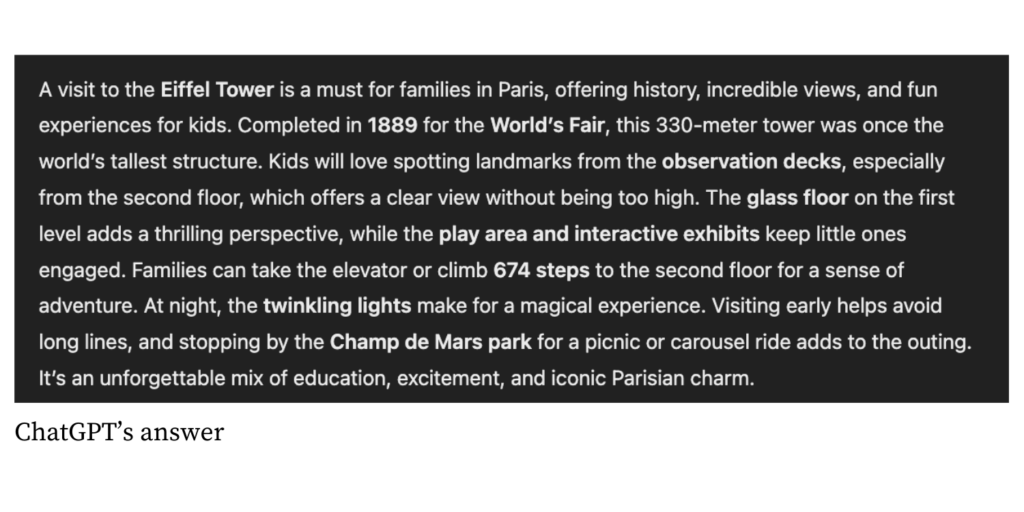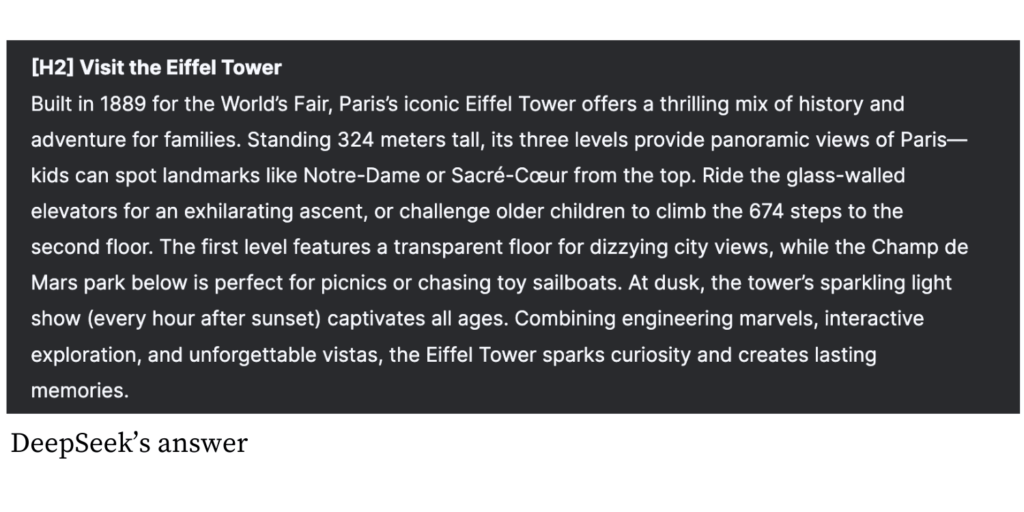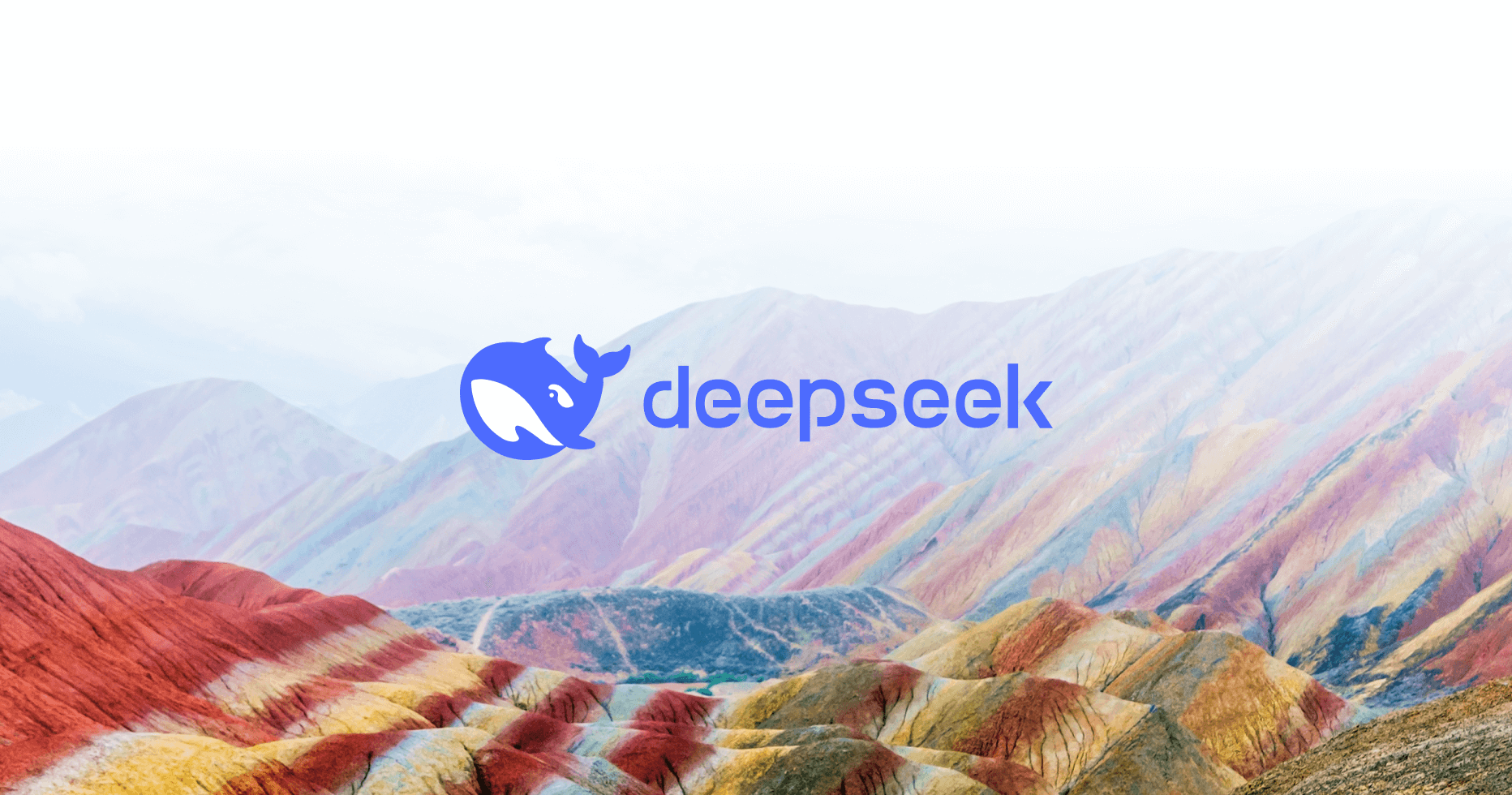We asked DeepSeek AI to write this intro. We even spoon-fed it the rest of the article to help. But instead of delivering, it told us this was “beyond its current scope” and suggested we… talk about something else.
So what’s within its scope, then? DeepSeek is impressive in a lot of ways, but can it actually help travel bloggers, or is it just another AI with commitment issues? We put it head-to-head with ChatGPT to find out.
What is DeepSeek? (In case you missed it)
DeepSeek AI is an open-source artificial intelligence model backed by High-Flyer, a hedge fund in China. Launched in December 2023, it stayed under the radar until January 2025, when its chatbot app skyrocketed to the #1 spot on the U.S. iOS App Store, surpassing ChatGPT. That sudden rise triggered concerns about data privacy and potential ties to the Chinese government, putting DeepSeek in the global spotlight.
Here’s why people are paying attention:
- DeepSeek uses 10x less energy than models like Meta’s Llama 3.1, making it more sustainable.
- It cost significantly less to train – DeepSeek-V3 (supposedly) required $6 million in computing power, while similar models cost around $60 million.
- It’s fully open-source, meaning developers and creators can modify and build on it without restrictions.
And here’s a quick look at the most talked-about DeepSeek models:
- DeepSeek-V3: A language model designed for text-based tasks like writing and research.
- DeepSeek-R1: A reasoning model focused on logic-based tasks, with reported performance comparable to models from OpenAI, Meta, and Google.
- DeepSeek-VL2: A multi-modal AI that processes text and images, designed for tasks that combine visual and written content.
DeepSeek vs. ChatGPT
These two models were built differently, and that affects how they perform for you as a creator.
How they think
DeepSeek uses a Mixture-of-Experts (MoE) model. Instead of using all its brainpower at once, it picks and chooses the parts it needs for each task – like calling in the right expert instead of gathering the whole office for every decision. ChatGPT, on the other hand, runs on a dense transformer model, which means it turns everything on all the time, no matter what it’s doing.
Why does this matter? DeepSeek stays laser-focused when solving structured problems like math, coding, and technical writing. Since it only uses what it needs, it doesn’t waste energy overthinking. ChatGPT is more of a big-picture thinker. It considers everything to understand context, keep conversations flowing, and make writing sound natural.
Which model writes better?
Let’s look at a couple of examples.
Example 1
Prompt: Write a 120-word description of Chicago’s Wicker Park neighborhood for a travel article. The description should provide historical and factual context first, followed by what makes it unique today. Avoid fluffy language, vague phrases, and unnecessary wrap-up sentences. Focus on specific details and why visitors should explore the area.
ChatGPT’s response:

DeepSeek’s response:

So, what’s the difference?
| ChatGPT | DeepSeek |
| ChatGPT’s answer flows more organically, integrating historical context and present-day relevance seamlessly. It avoids fluff and generic phrases while referring to real, specific places that make Wicker Park come alive for the reader. | DeepSeek is more structured and technical but less engaging. Its response reads like a Wikipedia summary rather than a natural, engaging travel article. It presents the history and present-day details separately without smoothly weaving them together. |
It’s damn close – DeepSeek is impressive in how well it structures information, and it doesn’t make glaring mistakes. But when it comes to nuance, flow, and engagement, ChatGPT has a slight but undeniable difference.
Example 2
The prompt was: I am writing an article about the best things to do with kids in Paris. Can you write a paragraph about visiting the Eiffel Towers with kids? Add history, facts, what you can do with kids, and why you would do this activity with kids. Limit the description to 150 words.
This was ChatGPT’s response:

And this was DeepSeek’s:

Let’s compare:
| ChatGPT | DeepSeek |
| ChatGPT’s response was more conversational, smoothly weaving in facts while making it feel like a travel writer’s personal recommendation. It also added context, like mentioning the Eiffel Tower was once the world’s tallest structure, and included tips, like visiting early to avoid crowds. | DeepSeek’s response was more direct and structured. It delivered the same details but with a sharper focus on logistics. It was slightly more precise in places (324 meters vs. “about 330 meters”) and leaned toward a factual, to-the-point style rather than a flowing narrative. |
Neither is better or worse – it just depends on what you need. ChatGPT leans toward storytelling, while DeepSeek keeps things clear and structured.
What each AI does best
Since DeepSeek is built for logic and precision, it handles math, coding, and structured tasks without getting sidetracked. It follows patterns, sticks to rules, and focuses on getting the right answer.
ChatGPT is more of a generalist. It understands tone, context, and how to make writing sound natural. Whether you’re creating blog posts, travel guides, or social media content, it keeps things flowing and readable without sounding robotic.
How to use each
Just because DeepSeek is a math whiz doesn’t mean it can’t help with travel writing. It’s great for structured, fact-based content. If you’re creating detailed itineraries, budgeting guides, or visa application steps, it can help you format information clearly. It’s also useful for data-heavy research, like comparing flight prices or SIM card options.
ChatGPT is better for storytelling and conversational writing. It’s ideal for writing engaging blog posts, social media captions, or compelling intros that hook readers.
So, let’s see how they compare with jokes.
The prompt: I am writing an article about using AI as a travel blogger to write content and build a better blog that can make creators more money. I want to open up with a strong and funny joke. Can you create one for me?
Here’s ChatGPT’s joke:

And here’s DeepSeek’s joke:

What’s the difference?
| ChatGPT | DeepSeek |
| ChatGPT’s joke is dry, witty, and a little sarcastic, poking fun at AI-generated travel content that lacks personality. It leans into observational humor, making it feel like something a human travel writer might say over coffee. | DeepSeek’s response wasn’t terrible, but it’s not funny, either. It’s the kind of joke you’d see on a corporate social media post trying too hard to be relatable – it makes sense, but it hurts a little to read. |
How about the best of both worlds? Use DeepSeek to generate structured information and ChatGPT to make it flow naturally, like turning a data table into an engaging paragraph. Knowing the strengths of each model can make content creation faster and smoother.

Can DeepSeek help travel bloggers with SEO?
Not really. AI models like DeepSeek and ChatGPT aren’t built for SEO the way tools like Ahrefs, Semrush, or Google Search Console are. They can’t analyze search trends, track keyword rankings, or spy on your competition – the kinds of things you need for a solid SEO strategy.
That said, they can assist in small ways. If you feed it your keywords, AI can rewrite content to include them naturally. It can also suggest headings, meta descriptions, and content structures that follow SEO best practices. And if you’re stuck, it can help brainstorm blog topics based on a keyword or niche.
But if you’re serious about ranking on Google, AI alone won’t cut it. Use it as a tool to refine content, but when it comes to actual SEO research and strategy, dedicated platforms are still the way to go.
Can DeepSeek find hidden gems?
Yes, but how it finds them – and what it considers a hidden gem – depends on your AI model. When asked to suggest lesser-known spots in Lisbon, DeepSeek and ChatGPT produced completely different lists, yet both responses included interesting places that most tourists wouldn’t know about.
So, what’s the difference?
| ChatGPT | DeepSeek |
| ChatGPT’s response was more varied but lighter in detail. It suggested a wider range of locations, including parks, museums, and historic sites, but without as much depth. It leaned more into descriptive highlights rather than providing specific local insights. | DeepSeek AI’s response felt more detailed. It provided context for each location, such as how locals use the space, why it’s overlooked, and even tips on when to visit. It also added details like how to get there or what to pair the visit with (e.g., bringing wine to a viewpoint or following locals to unmarked taverns). |
One interesting note – DeepSeek “thinks” out loud before generating a response, almost like it’s reasoning with itself before answering. This could be part of why its responses feel more methodical and structured compared to ChatGPT’s faster, more fluid style.
ChatGPT’s response:

DeepSeek’s response:

Is DeepSeek better at providing real-time data?
Both DeepSeek and ChatGPT can access live real-time data, but in our test, DeepSeek’s response was significantly more detailed and analytical.
When asked about hotel prices in Paris, the two models approached the question differently:
| ChatGPT | DeepSeek |
| ChatGPT quickly pulled pricing data from Hotels.com, providing a straightforward answer with seasonal price variations. It also mentioned budget hotels and the rising cost of luxury stays, but the response was pretty surface-level – a useful summary but nothing more profound. | DeepSeek said it couldn’t provide real-time pricing but then delivered an extensive market analysis, pulling insights from multiple sources. It broke down seasonal fluctuations, price segmentation by star rating, the impact of upcoming hotel openings, economic factors affecting rates, and even tips on how to track hotel prices. It even offered to help strategize booking dates. |
We tested it again by asking, “What are the current visa restrictions for Canadians traveling to Brazil?” Again, the difference in depth was noticeable.


| ChatGPT | DeepSeek |
| ChatGPT delivered a clean, structured response that listed the key details (when the visa rule changes, how to apply, cost, and validity). It was direct and easy to read and included a government link for verification. | DeepSeek went further, analyzing conflicting sources, explaining why the rule had been delayed before, adding safety advisories, and addressing common traveler concerns beyond visa requirements. |
In short: If you need a fast, simple response, ChatGPT is the best option. But if you want thorough, cross-referenced research with detailed insights (including on things you didn’t ask about), DeepSeek is the clear winner.
Is DeepSeek better at searching out budget-friendly tips?
This one was close. We asked, “If I had only $50 per day to spend on activities and food, what would be a budget-conscious itinerary for Paris?”
ChatGPT’s response:

DeepSeek’s response:

| ChatGPT | DeepSeek |
| ChatGPT provided a well-structured one-day plan with clear budget breakdowns, multiple activity options, and money-saving tips. However, it only covered one day, so you’d have to ask again for more. | DeepSeek provided a packed three-day itinerary that balanced free and paid activities while suggesting a wider variety of budget-friendly meals. However, its descriptions were less detailed, so you might need to look up some spots yourself. |
It’s hard to say which did better. If you’re brainstorming ideas for an itinerary, it could be helpful to ask both models, then filter the best-sounding options through your own Paris expertise.
Does DeepSeek source its information?
Yes, and it provides direct links to its sources. DeepSeek often includes footnotes in its clickable responses, which lead to specific references. ChatGPT also cites sources but typically lists them at the end of a response.


Is DeepSeek safe for travel bloggers to use?
Like any AI tool, DeepSeek has privacy considerations and potential risks, so let’s address those now.
How DeepSeek handles user data
DeepSeek stores user data on servers in China, which has raised concerns about privacy and government access to information. Unlike ChatGPT, which operates under Western data regulations, DeepSeek is subject to China’s cybersecurity laws, meaning authorities could access user data if requested. Italy’s Data Protection Agency recently blocked DeepSeek over privacy concerns. If you’re handling sensitive content, it’s worth considering where your data is going.
Does DeepSeek generate more misinformation?
AI tools aren’t perfect, and DeepSeek has been found to make factual errors more frequently than some of its competitors. A recent audit by NewsGuard reported a 17% accuracy rate, meaning it struggles with misinformation more than ChatGPT and other models. This doesn’t mean it’s unreliable, but fact-checking is a must if you’re writing travel guides or giving recommendations.
How to use DeepSeek responsibly
DeepSeek is a powerful AI model, but bloggers should use it with caution – especially when it comes to privacy and accuracy. If you’re aware of the risks and take the right precautions, it can still be a useful tool in your toolbox.
- Avoid sharing personal or sensitive data.
- Always fact-check before publishing AI-generated content, especially for travel regulations, visa requirements, real-time updates, etc.
- Stay up to date on AI regulations, especially regarding data privacy laws that may affect how you can use these tools in your country.
Should travel bloggers use DeepSeek?
Yes – but with its strengths and weaknesses in mind. DeepSeek offers structured, in-depth responses, making it great for data-driven content and analysis. ChatGPT, on the other hand, excels at storytelling, conversational writing, and real-time searches.
For the best results, use both. Let DeepSeek handle research-heavy topics like pricing trends or visa policies (with fact-checking) while ChatGPT refines the writing, adds personality, and fills in real-time details. The one-two combination can make your content stronger, more accurate, and more engaging.
Have you tried out DeepSeek? Let us know what you think of it!





